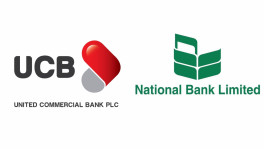Nobo Jatra’s mission to ensure healthier childhood in remote areas
Surany goes to the child service centre every month for her child’s medical check-up since she gave birth to her second child 22 months ago

On a hot sunny day in August, Surany Mondol (27) of remote Pankhali union under Dacope upazila in Khulna came to a child service centre for her kid's health check-up. Immediately after her arrival at the centre, the service givers measured her child's weight and vaccinated it.
Surany goes to the child service centre every month for her child's medical check-up since she gave birth to her second child 22 months ago.
"To know whether a child is in good health, regular health check-up, including measuring weight, of them is very important," said the unschooled mother adding that the baby's diet has to be adjusted depending on their weight.
Like Surani, all of the several other mothers who came to that child healthcare centre were unschooled but well aware of their children's health and nutrition. The centre has been set up under the USAID-funded Nobo Jatra project – implemented by development organisation World Vision.
Asked how they had come to know so much about child health, the mothers said they learned these from field officers of the World Vision.
"Earlier, we knew nothing about child health and nutrition. Children in our area were suffering from several complications induced by malnutrition. Child mortality rate was also higher.
"But the picture has changed now. Nobo Jatra has taught us how to deal with these issues", said Mukta Mondol, a mother of an 18-month-old boy.
"They even taught us how to take care of a pregnant woman and how to give birth to a healthy child," she added.
Replying to a query, Nobo Jatra WASH Specialist Nazneen Ara said, their field officers go from house to house one day prior to the monthly health check-up of children to make sure no child is left out. "We conduct the programme (health check-up) for two years – once every month. In addition, nine vaccines are given officially."
"After these two years, we have another programme called 'Household Visit'. Children's houses are visited and monitored every month and our indicators are followed up through backyard meetings."
In addition, when a child reaches the age of two years, we provide services depending on their need.
The Nobo Jatra project has been working for six years to improve gender equitable food security, nutrition, and resilience for vulnerable populations.
Alex Bekunda, chief of party at World Vision, said they are working to improve the nutritional status of children under five years of age, and pregnant as well as lactating women.
"Till now, our service has reached around 2 lakh households in 40 unions under 4 upazilas," he said, adding the Nobo Jatra project will end in September 2022.
Under the Maternal Child Health and Nutrition Programme of the Nobo Jatra project, pregnant women are provided with a monthly cash allowance of Tk2,200 for 15 months to buy nutritious foods. So far, at least 25,813 women have received the benefit.
Besides, the organisation provides health services to pregnant women and adolescent girls for two years.
However, providing healthcare services to the people of that remote area was not easy.
Mohammad Azizul Haque, the manager of the Dacope field office of World Vision, said the biggest obstacle was the poor road connectivity and communication system, which often caused delays in providing services.
The setting up of the community clinic has resolved that problem to some extent, he said.
"But there is a challenge for the community clinic too," he mentioned, pointing out that there is only one doctor for a population of about 16,000-17,000. Because of this, the clinic has never been able to provide good services, he observed.
He further added that due to salinity in river and canal water, people here use pond water or rain water for drinking, which increases the risk of water-borne diseases.
"We found that inadequacy of drinkable sweet water has become the biggest challenge here. To solve this crisis, we have set up three reverse-osmosis-plants. Around 800-900 liters of water is being produced per hour at each plant. We are providing drinking water to the people at Tk0.50 per litre."
A villager Rima Begum said, "We collect drinking water from the plant. We harvest rainwater for cooking purposes."
She was shocked to hear the news that the project was going to end after one year.
Beneficiaries have demanded that the project be continued for several more years.


 Keep updated, follow The Business Standard's Google news channel
Keep updated, follow The Business Standard's Google news channel
















